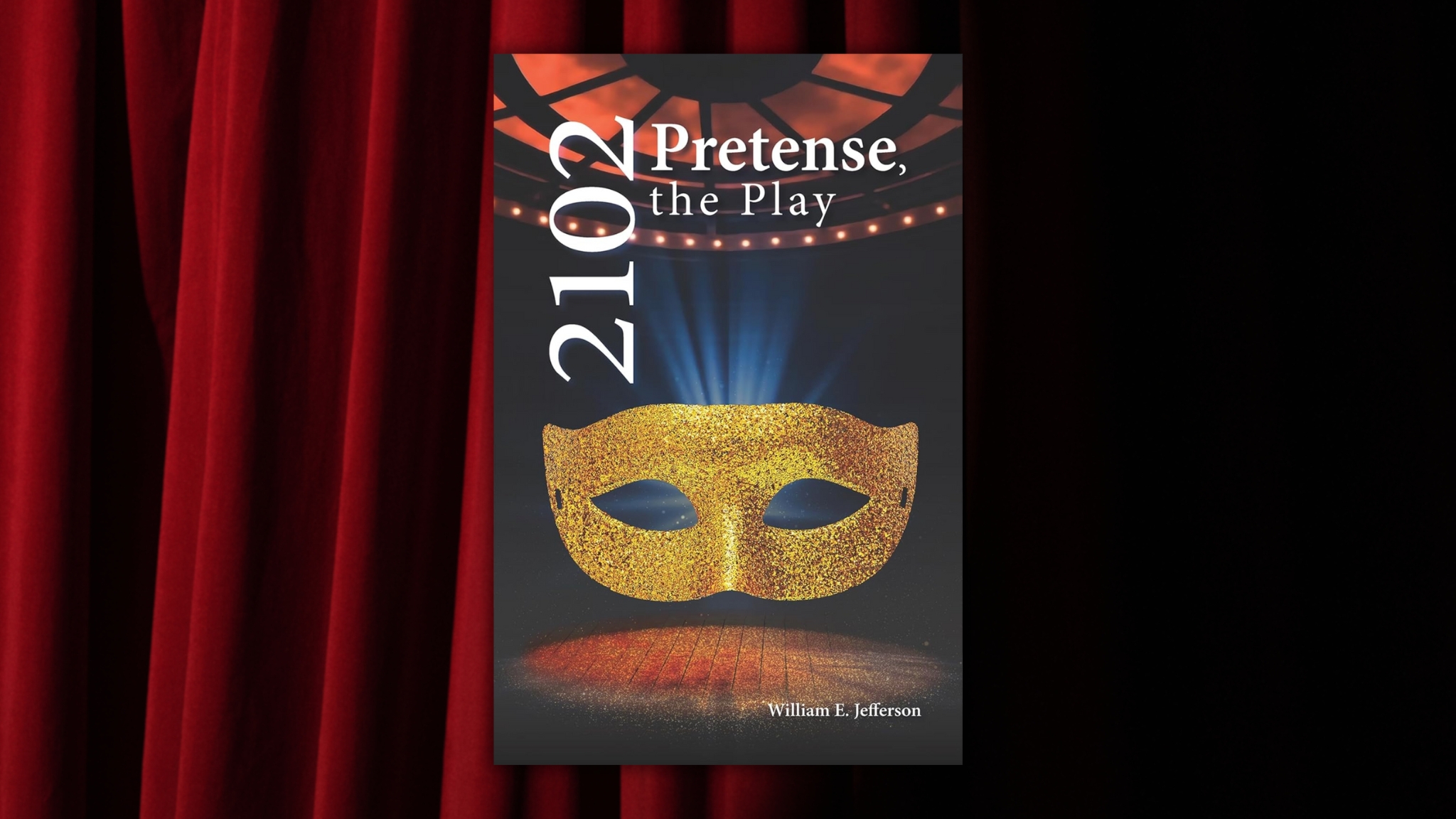2102: Pretense, the Play by William E. Jefferson
What's It About?
In the strange future world of Onglander, four time travelers arrive to overthrow the AI overlords and save the dwindling human population from their grotesque theaters of torture and death.“All the world’s a stage, and all the men and women merely players,” famously wrote Shakespeare in As You Like It. And in 2102: Pretense, the Play, William E. Jefferson takes this concept to an entirely different level with the strange world of Onglander — a country of the future swept up in grotesque theatrics where AI “discarts” sits in judgment of a dwindling cache of “carnite” humans, forcing them into command performances that often end in torture and death.
Enter four time travelers — the poet Quillingsworth and three mystical muses: Margin, Shadow and Lesser Light. Well, actually, there’s five time travelers, if you count Quill’s blue-headed parrot, Loreto. They’ve come from a past not too distant from today’s world. Their mission: overthrow the AI overlords and live to tell the cautionary tale to anyone in the past who’ll listen.
Upon arrival in 2102, the group finds themselves roped into the terrible pageantry that functions as a justice system in Onglander. What’s worse, when they try to extract themselves from the situation, they are accused of espionage and hunted down to be put on trial themselves — an ordeal that will eventually thrust them on center stage in a cruel spectacle to be witnessed by millions across Onglander.
Fortunately, Margin is an excellent strategist. After all, she may or may not be, in fact, Joan of Arc. She hatches a cunning plan to sabotage AI communications, not with technology, but through fragments of poetry and scripture. But even that won’t be enough to free the carnites from the discart tyranny. It will take all of them playing their parts covertly, courageously and flawlessly to save the future from the misguided choices of the past.
Stand Alone Sequel with Clever Connections to Previous Book
It’s worth noting that 2102: Pretense, the Play is a sequel to Jefferson’s Presence, the Play (our review here). And while the sequel easily stands on its own, those who have read the previous novel will possess a deeper context for how such a world in 2102 came about — humans may have fallen prey to their own creations, but it is the devil’s work at the core.
In fact, discarts have no use for faith or any sort of religion and relish twisting and corrupting stories from Judeo-Christian scripture into a “Myth Meltdown,” one of several initiatives used to break the wills of the carnites.
This tactic in particular forms the premise of the “Spy Plays” Quill and company endure. The group must act as commentators responding to false, AI-scripted narratives of Job and Moses. While their commentary is deliberately fragmented and seemingly random in order to sow chaos among the AI, the passages of verse (both poetic and biblical) offer a sort of inherent logic within the context of the story they are debating. It’s a delightful effect and worth close reading.
Readers of the previous novel will also enjoy discovering parallel devices employed in the sequel. Among them, a writer who has fallen ill and been mysteriously transported to another place, a trio of mysterious and wise beings, a bird that can talk, passages of literature, feats of magic, strong comradery, and feasts of scrumptious food. And let’s not forget Jefferson’s wonderful ear for language.
Elaborate Metaphors to Celebrate What is “Human”
The two books also share continuity of themes, as they are both concerned with the perils of AI and principles of media ecology, although these are explored in much different ways.
In 2102, theater becomes metaphor on a number of levels. Humans have created images of themselves called avalites, which act as their proxies on all manner of drudgery — essentially being recruited as stand-in actors. Discarts can only pretend to be playwrights and producers; their creativity is based on algorithms, not inspiration.
Thus, the battle being fought within these pages is more than just past versus future, human versus inhuman. It is also one of faith versus logic, art versus artifice, invention versus reproduction. “Sameness, how tragic,” aptly comments Quill at one point. “Give me flaws, wobbling notes, imperfections, loose ends. Thus I know I’m human.”
And being human, Jefferson shows us, is something to celebrate, not to try to perfect by artificial means.
 About William E. Jefferson:
About William E. Jefferson:
William E. Jefferson holds an MTh in Theology and Media from the University of Edinburgh, and an MA in Communication from the Wheaton Graduate School. He serves on the board of the Marshall McLuhan Initiative (MMI) in Winnipeg, Manitoba, Canada, and is an active member and supporter of the Media Ecology Association, as well as the Institute of General Semantics. The author of several books, Jefferson is the creator of the mystical Isle of Estillyen, beyond of the Storied Sea, introduced in his debut novel, Messages from Estillyen (www.estillyen.com). Concerning the worth of words, Jefferson offers the following: “When one considers that Edgar Allan Poe used a mere thirteen words to write ‘All that we see or seem is but a dream within a dream,’ the notion that ‘a picture is worth a thousand words’ comes forth as naught.”





